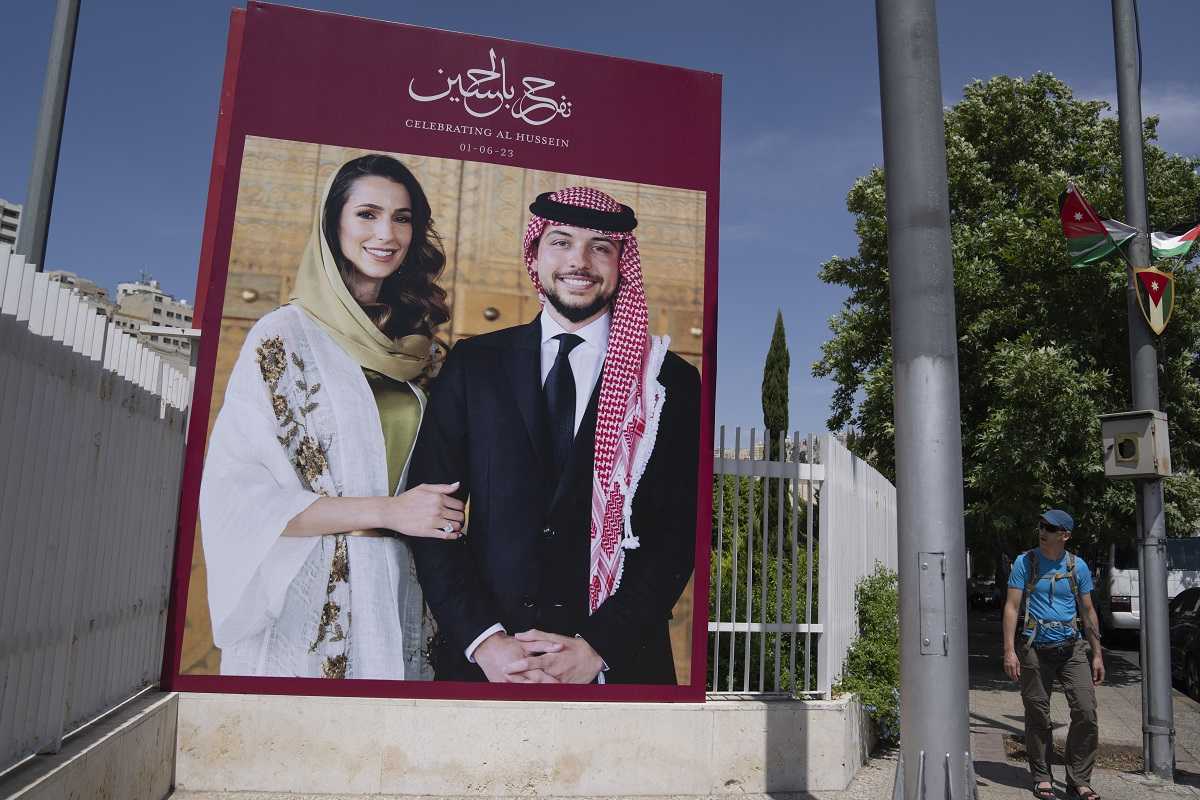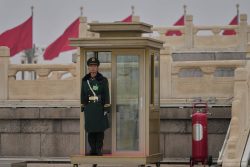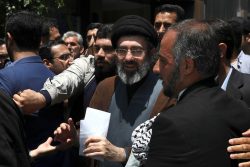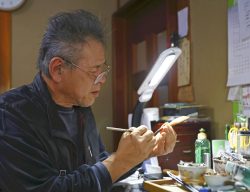
A poster with pictures of Crown Prince Hussein and his fiancee, Saudi architect Rajwa Alseif is posted at the main road in down town Amman, Jordan, Tuesday, May 30, 2023.
16:33 JST, May 31, 2023
He’s heir to the throne in one of the oldest monarchies in the Middle East and a descendant of the Prophet Muhammad. She’s a Saudi architect with an aristocratic pedigree of her own.
Crown Prince Al Hussein bin Abdullah II, 28, and Rajwa Alseif, 29, are to be married on Thursday at a palace wedding in Jordan, a Western-allied monarchy that has been a bastion of stability for decades as Middle East turmoil has lapped at its borders.
The families have not said how the couple met or provided any details about their courtship. They were formally engaged at a traditional Muslim ceremony in the Saudi capital, Riyadh, in August 2022 that was attended by senior members of Jordan’s royal family.
The bride and groom are destined to become a power couple in the Middle East, forging a new bond between Jordan and Saudi Arabia as the latter seeks to transform itself into a regional power broker.
Here’s a look at the bride and groom.
A US-EDUCATED ARCHITECT WITH ARABIAN TRIBAL ROOTS
Rajwa Alseif was born in Riyadh on April 28, 1994, the youngest of four children.
Her mother, Azza bint Nayef Abdulaziz Ahmad Al Sudairi, is related to Hussa bint Ahmed Al Sudairi, who is said to have been the favorite wife of Saudi Arabia’s founder, King Abdul-Aziz Al Saud, and gave birth to seven of his sons, including the country’s current ruler, King Salman.
For decades, the so-called Sudairi Seven, most of whom are now deceased, were seen as a major locus of power within the Saudi royal family.
Alseif’s father, Khalid, is a member of the Subai, a prominent tribe in the Arabian Peninsula with ancient roots. He’s also the founder of El Seif Engineering Contracting, which built Riyadh’s iconic Kingdom Tower and other high-rises across the Middle East.
Rajwa studied architecture at Syracuse University in New York, where she graduated with a bachelor’s degree in 2017. A graduation video shows her receiving her degree in sparkling silver sneakers.
The year before, she led a Spring Break architecture symposium in Dubai, in the United Arab Emirates, that was funded by her father’s company.
“What made this trip so memorable for me… was seeing the students in the studio experience Arabic culture and architecture for the first time,” she was quoted as saying by a university newspaper.
She went on to earn a degree in visual communications from the Fashion Institute of Design and Merchandising in Los Angeles.
An official biography shared by the Jordanian royal palace says her hobbies include horseback riding and handmade arts, and that she is fluent in English, French and her native Arabic.
A CROWN PRINCE LONG GROOMED TO LEAD
Crown Prince Hussein was born June 28, 1994. His path to succession became clear when his father, King Abdullah II, stripped his own half-brother, Prince Hamzah, of the title of crown prince in 2004. Hussein was formally named heir to the throne five years later, at the age of 15.
He is the oldest son of Abdullah, 61, who has ruled Jordan as a reliable Western ally and voice of moderation through more than two decades of turmoil in Israel, the Palestinian territories, Syria and Iraq, all of which border the small, resource-poor kingdom.
The Hashemites, as Jordan’s ruling family is known, trace their lineage back to the Prophet Muhammad. They dwelled in the Hejaz region of what is now Saudi Arabia for centuries before King Abdul-Aziz Al Saud’s forces drove them out in 1925.
The Hashemites had led the Arab revolt against the Ottoman Empire during World War I, a rebellion dramatized by the 1962 film “Lawrence of Arabia.” They had hoped to rule over an Arab state encompassing much of the Middle East, but Western imperial powers betrayed them. The French drove them out of Syria and a nationalist uprising toppled them in Iraq, leaving them with only Jordan.
The crown prince is named for his grandfather, King Hussein, who ruled Jordan for 46 years until his death in 1999 and remains a beloved figure for many Jordanians.
It could be years before the crown prince becomes king, but his training has already begun.
He graduated from Georgetown University with a degree in international history in 2016 and from the British Royal Military Academy in Sandhurst the following year. He holds the rank of captain in the Jordanian military and routinely takes part in drills and ceremonies.
He has joined his father on overseas trips, including a recent meeting at the White House with President Joe Biden. The prince shared pictures from the visit on his Instagram feed, which has over 4 million followers and also features more casual photos.
In 2015, Hussein was the youngest person to ever chair a meeting at the U.N. Security Council, leading a discussion about how to help young people confront violent extremism and promote peace. Two years later, and just out of college, he addressed the U.N. General Assembly.
His experiences to date may have prepared him to rule Jordan, but he also exists in a world apart from most of his fellow citizens, who have suffered in recent years from diminishing economic prospects. Elected governments in Jordan have long served as a seawall for public anger, even as the king has always held the real power.
It’s a reality the young crown prince may have to confront someday, long after his palace wedding.
Top Articles in News Services
-

Survey Shows False Election Info Perceived as True
-

Hong Kong Ex-Publisher Jimmy Lai’s Sentence Raises International Outcry as China Defends It
-

Japan’s Nikkei Stock Average Falls as US-Iran Tensions Unsettle Investors (UPDATE 1)
-

Japan’s Nikkei Stock Average Touches 58,000 as Yen, Jgbs Rally on Election Fallout (UPDATE 1)
-

Japan’s Nikkei Stock Average Rises on Tech Rally and Takaichi’s Spending Hopes (UPDATE 1)
JN ACCESS RANKING
-

Producer Behind Pop Group XG Arrested for Cocaine Possession
-

Japan PM Takaichi’s Cabinet Resigns en Masse
-

Man Infected with Measles Reportedly Dined at Restaurant in Tokyo Station
-

Israeli Ambassador to Japan Speaks about Japan’s Role in the Reconstruction of Gaza
-

Videos Plagiarized, Reposted with False Subtitles Claiming ‘Ryukyu Belongs to China’; Anti-China False Information Also Posted in Japan




























